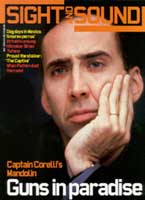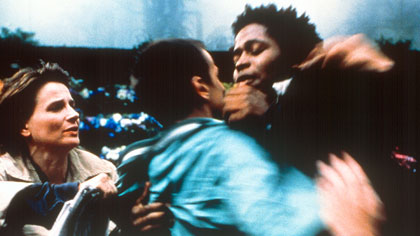
Code Unknown
France/Germany/Romania 2000

Reviewed by Richard Falcon
Synopsis
Our synopses give away the plot in full, including surprise twists.
Paris, the present. Anne (Juliette Binoche), an actress, meets Jean (Alexandre Hamidi), the younger brother of her war-photographer boyfriend Georges (Thierry Neuvic). Jean has run away from his father's farm and asks her for the new entry code to her apartment; he then discards a crumpled paper bag into the lap of Maria (Luminita Gheorghiu), a Romanian illegal immigrant who is begging on the street. Amadou (Ona Lu Yenke), a teacher of deaf children, remonstrates with him. In the ensuing scuffle, policemen arrest Maria and Amadou. Maria is deported. Amadou's West African mother expresses her grief at the treatment of her son. Anne performs a scene from the thriller she is filming, in which she is imprisoned in a soundproof room by a killer.
Georges returns from Kosovo, where he has been photographing atrocities. In Romania, Maria returns to her husband Dragos (Bob Nicolescu) and her family, with whom she moves into a small flat. She is ashamed of having had to beg in Paris, although she did send money home. Jean disappears from his father's farm. His father responds by killing his livestock, telling Anne and Georges that he is unable to run the farm without Jean's help. Anne hears sounds of distress coming from an adjoining apartment but is unsure what to do. She confronts an elderly neighbour who, she believes, pushed a note through her door purporting to be from an abused child in the other apartment; the old woman denies it. Antagonised by Georges' inability to settle, Anne starts a scene with him in a supermarket, claiming that she aborted their child while he was away. Georges surreptitiously photographs passengers on the Métro. Maria pays to be smuggled back to Paris. Anne, travelling home on the Métro, is tormented by an Arab youth who spits in her face before being challenged by a middle-aged Arab man. As Maria starts to beg on the street, Georges finds the code to the apartment changed and Amadou's students perform a piece for massed drums.
Review
"Morality," Cahiers du cinéma critic Luc Moullet famously said in 1959,"is a question of tracking shots." Michael Haneke's first - predominantly- French-language film begins with an exquisitely realised nine-minute tracking shot initially following Juliette Binoche's Anne as she walks along the street. Were this not a Haneke film, it would be tempting to view these opening moments as a homage to the nouvelle vague film-makers' fondness for long-take sequences that juxtapose a beautiful actress with a Parisian boulevard caught in real time. But as in Haneke's earlier 71 Fragments of a Chronology of Chance and The Seventh Continent, both of which introduce the fragmented, episodic narrative structure employed in Code Unknown, Haneke is concerned here with philosophical first principles rather than referentiality. As this sequence-shot bears witness to the sudden street incident that links the disparate experiences of Maria (a Romanian immigrant), Amadou (the son of West African refugees), Anne, and Jean (the brother of Anne's boyfriend Georges), the film offers the first of a number of scenes which use the multicultural public spaces of Paris, not for their fashionability (Haneke points out he could as easily have filmed his script in London) but as a laboratory for testing the relationship between representation and reality. The results confirm Haneke's reputation as one of cinema's most accomplished moralists.
Both Benny's Video and Funny Games tended to didacticism and indulged Haneke's perverse modernist desire to punish us for our collusion with the commodified- and thus, for Haneke at least, mendacious- narrative certainties of dominant cinema. Code Unknown, on the other hand, furthers Haneke's project of countering what he sees as the degradation of our sense of the real by modulating with true virtuosity between various realisms. The opening sequence is by turns manipulative- stoking our indignation at the policemen's casually insensitive and implicitly racist handling of the confrontation between Jean and Amadou- and naturalistic, artfully thwarting our desire to reach easy judgement. In a later sequence in the Métro, a static camera observes in neutral long shot- again with an unbroken take- as Anne is tormented by an aggressive Arab youth who, incensed by her lack of reaction to his unprovoked taunts, spits in her face. In between the film presents us with fragments- interspersed with Brechtian fades and sudden Godardian sound edits- which turn on the difficulty of relating in a moral fashion to others in a world in which any communication seems fraught with the dangers of victimisation. Anne, while ironing, turns down the television when she hears screams coming from another apartment and this too is left unexplained and unresolved. Alongside this quotidian malaise are the characters' attempts to achieve contact through dissimulation, such as when Anne challenges her elderly neighbour, who may or may not have written a letter purporting to be from an abused child in the adjoining apartment, or when Anne, during an argument with Georges, claims- we don't know whether it's true or not- to have aborted his child when he was in Kosovo. Georges' own subterfuge, his surreptitious photographing of people on the Métro- a form of surveillance that leads to a marvellous montage of portraits (the work of war photographer Luc Delahaye)- further complicates the film's insistent thematic build-up around responsibility to others and the unbridgeable glacial distance between people.
As Haneke has suggested in interviews, all of this would merely be a reiteration of various modernist clichés about the impossibility of communication were the film not to comprise one superb sequence after another. Rather than dryly demonstrating a thesis, each scene conveys a deeply affecting sense of authenticity and immediacy. The performance of the deglamorised- but still luminescent- Juliette Binoche, whose approach to Haneke initiated the film, contributes immeasurably to the success of Code Unknown. A sequence from the film she is shooting (she plays an actress), in which she is interrogated- one of two startling scens that reveal Haneke's grasp of the strength of our desire to be manipulated (the other- at first deliberately confusing levels of reality - involves a toddler crawling on the edge of a tall building)- is a masterclass in close-up acting. That amid all these heavy-duty moral/aesthetic preoccupations Haneke manages to offer powerfully understated images of the lot of economic migrants- Maria's silent deportation and return to Paris- adds to the sense of Code Unknown as a major achievement. Orchestrating his long takes, his superb use of off-screen space and chilly long shots, Haneke sets about if not reinventing, then reinvigorating a non-naive realism for the 21st century. In the process, he gives us the most intellectually stimulating and emotionally provocative piece of European cinema of recent times.
Credits
- Director
- Michael Haneke
- Producers
- Marin Karmitz
- Alain Sarde
- Screenplay
- Michael Haneke
- Director of Photography
- Jürgen Jürges
- Editors
- Andreas Prochaska
- Karin Hartusch
- Music
- Giba Gonçalves
